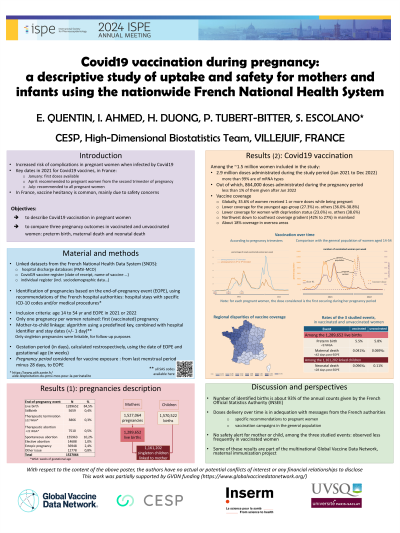Pregnancy and lactation
Session: Poster Session B
(252) Covid19 Vaccination During Pregnancy: a Descriptive Study of Uptake and Safety for Mothers and Infants Using the Nationwide French National Health System
Tuesday, August 27, 2024
8:00 AM - 6:00 PM CEST
Location: Convention Hall II

- EQ
Elise Quentin
Inserm, France
- IA
Ismaïl Ahmed
Inserm, France
- HD
Hong Duong
Inserm, France
- PT
Pascale Tubert-Bitter
Inserm, France

Sylvie Escolano, PhD (she/her/hers)
Biostatistician
Inserm, France
Co-Author(s)
Presenting Author(s)
Background: Pregnant women are at increased risk of complications when infected by Covid19. Vaccination was available in France in January 2021, recommended to pregnant women from the second trimester of pregnancy in April 2021, and to all pregnant women in July 2021. In France, vaccine hesitancy is frequent, mainly due to safety concerns. Medico-administrative databases are a useful tool to provide knowledge on vaccine uptake and safety in this population. France is part of the multinational Global Vaccine Data Network.
Objectives: To describe Covid19 vaccination in French pregnant women and compare three pregnancy outcomes in vaccinated and unvaccinated women.
Methods: We used the French National Health Data System (SNDS). All pregnant women aged between 14 and 54 during 2021-2022 were identified from hospital databases using ICD10 codes or medical procedures defining deliveries or all other possible pregnancy-ending events occurring at hospital (live birth, stillbirth, medical termination, elective termination, miscarriage, ectopic pregnancy, …). Likewise, all births were identified and neonates were linked to their mothers. Three outcomes were studied: preterm birth (delivery of a live birth before 37 weeks of amenorrhea), maternal death (during pregnancy or within 42 days post-delivery) and neonatal death (within the first 28 days of life). The Covid19-vaccine registry was used to retrieve their vaccination details, when vaccinated. In case of several pregnancies, only the first one was considered.
Results: Over the two-year period, about 1.5 million pregnancies were identified. Most frequent issues were: live births (84.5%), elective terminations (10.2%), spontaneous abortions (2.4%) and ectopic pregnancies (1.0%). We observed 102 maternal deaths and 1217 neonatal deaths. We found that 35.6% of women received at least one dose of vaccine during their pregnancy and among them, 51.6% received several doses. Coverage was about 18% in overseas regions and 27.1%-42.3% in mainland France regions. It was 27.1% for the youngest women (under 25) and 35.9%-38.2% for the three other 10-year age groups. Among the 0.9 million doses administrated during pregnancy period, less than 1% were other than mRNA vaccines. The weekly number of women starting immunization fluctuated but peaked in summer 2021. The rate of preterm birth was slightly lower in vaccinated (5.5%) than in unvaccinated (5.8%) women. The rate of maternal (resp. neonatal) death was lower in vaccinated (0.041‰ resp. 0.096‰) than in unvaccinated (0.069‰ resp. 0.11‰) women. Similar trends were observed for non-mRNA vaccines.
Conclusions: This study gives an overview of attitudes of French pregnant women towards Covid19 vaccination. No safety alert was observed. This knowledge could help improve future vaccination campaigns.
Objectives: To describe Covid19 vaccination in French pregnant women and compare three pregnancy outcomes in vaccinated and unvaccinated women.
Methods: We used the French National Health Data System (SNDS). All pregnant women aged between 14 and 54 during 2021-2022 were identified from hospital databases using ICD10 codes or medical procedures defining deliveries or all other possible pregnancy-ending events occurring at hospital (live birth, stillbirth, medical termination, elective termination, miscarriage, ectopic pregnancy, …). Likewise, all births were identified and neonates were linked to their mothers. Three outcomes were studied: preterm birth (delivery of a live birth before 37 weeks of amenorrhea), maternal death (during pregnancy or within 42 days post-delivery) and neonatal death (within the first 28 days of life). The Covid19-vaccine registry was used to retrieve their vaccination details, when vaccinated. In case of several pregnancies, only the first one was considered.
Results: Over the two-year period, about 1.5 million pregnancies were identified. Most frequent issues were: live births (84.5%), elective terminations (10.2%), spontaneous abortions (2.4%) and ectopic pregnancies (1.0%). We observed 102 maternal deaths and 1217 neonatal deaths. We found that 35.6% of women received at least one dose of vaccine during their pregnancy and among them, 51.6% received several doses. Coverage was about 18% in overseas regions and 27.1%-42.3% in mainland France regions. It was 27.1% for the youngest women (under 25) and 35.9%-38.2% for the three other 10-year age groups. Among the 0.9 million doses administrated during pregnancy period, less than 1% were other than mRNA vaccines. The weekly number of women starting immunization fluctuated but peaked in summer 2021. The rate of preterm birth was slightly lower in vaccinated (5.5%) than in unvaccinated (5.8%) women. The rate of maternal (resp. neonatal) death was lower in vaccinated (0.041‰ resp. 0.096‰) than in unvaccinated (0.069‰ resp. 0.11‰) women. Similar trends were observed for non-mRNA vaccines.
Conclusions: This study gives an overview of attitudes of French pregnant women towards Covid19 vaccination. No safety alert was observed. This knowledge could help improve future vaccination campaigns.
